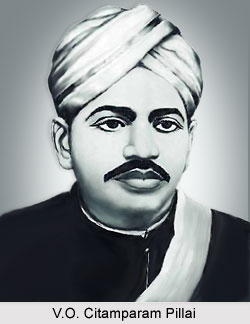 V.O. Citamparam Pillai, alternatively known as V. O. Chidambaram Pillai, was a prominent author, a political leader and Indian freedom fighter from Tamil Nadu. He has rendered great and valuable service to the Indian freedom struggle and has also contributed much to the progress of modern era in Tamil literature. V.O. Citamparam Pillai was also known as Kappalottiya Tamilan or The Tamil Helmsman. He has composed many literary works that have gained tremendous popularity amongst the readers. Some of his works include Meyyaram (1914), Meyyarivu (1915), Thirukural with literary notes of Manakudavar (1917), Tolkappiyam with literary notes of Ilampooranar (1928) and an autobiography (1946).
V.O. Citamparam Pillai, alternatively known as V. O. Chidambaram Pillai, was a prominent author, a political leader and Indian freedom fighter from Tamil Nadu. He has rendered great and valuable service to the Indian freedom struggle and has also contributed much to the progress of modern era in Tamil literature. V.O. Citamparam Pillai was also known as Kappalottiya Tamilan or The Tamil Helmsman. He has composed many literary works that have gained tremendous popularity amongst the readers. Some of his works include Meyyaram (1914), Meyyarivu (1915), Thirukural with literary notes of Manakudavar (1917), Tolkappiyam with literary notes of Ilampooranar (1928) and an autobiography (1946).
Early Life of V.O. Citamparam Pillai
V.O. Citamparam Pillai was born as Vallinayagam Olaganthan Chidambaram Pillai on5th September, 1872, to the parents Olaganathan Pillai, a lawyer, and Paramayee Ammal in Ottapidaram, in the district of Tuticorin, Tamil Nadu. When he was merely 6 years old, Citamparam Pillai learnt Tamil from his mentor Veeraperumal Annavi. Later he also learnt English from Krishnan, a Taluk Officer during the evenings. At the age of 14, he went to Thoothukudi in order to pursue his education. V.O. Citamparam Pillai completed his studied from St. Xaviers High School and Caldwell High School, Thoothukudi and Hindu College High School, Tirunelveli.
After the completion of his education, the Tamil author worked Taluk office clerk for a brief period before he was sent to Thiruchirapalli by his father, to study Law. Citamparam Pillai his Pleadership examination in the year 1894 and came back to Ottapidaram to work as a pleader in 1895.
Political Career of V.O. Citamparam Pillai
During his early years, Citamparam was hugely influenced by the saint Ramakrishnananthar and Thilak Maharaj. In 1892, he became a disciple of Thilak Maharaj. Citamparam entered politics during 1905 after the partition of Bengal and joined the Indian National Congress. He also took the chair at the Salem District Congress session. V.O. Citamparam Pillai founded several institutions such as Swadeshi Prachar Sabha, National Godown, Dharmasanga Nesavu Salai, Desabimana Sangam and Madras Agro-Industrial Society Ltd. he also started an Indian shipping company which was registered as the Swadeshi Shipping Company on October 16th, 1906. Pillai was among the foremost nationalists to initiate the Swadeshi Steam Navigation Company that contended with a British company in carrying out ships between Tuticorin and Sri Lanka. These ships started daily service between Tuticorin and Colombo in Sri Lanka, as a sign of opposition against the British traders and the Imperial Government.
During 1908, the political activities of V.O. Citamparam Pillai attracted the attention of the British rulers and thus he was imprisoned in 12th March 1908. In the year 1920, he left the Indian National Congress due to various ideological differences with Mahatma Gandhi. Later Citamparam focused his efforts on instituting Labor Unions in Madras (now Chennai) and writing literary work in Tamil language. He was also a good friend of Bal Gangadhar Tilak and Tamil poet Paratiyar. Although V.O. Citamparam Pillai had devoted his life to the service of the country, he demonstrated great enthusiasm in writing in Tamil, which was his mother tongue.
Literary Works of V.O. Citamparam Pillai
V.O. Citamparam Pillai or V. O. Chidambaram Pillai wrote a number of Tamil prose works which gained immense popularity amongst the readers. He translated the English author James Allen`s various concepts in Tamil, which was segmented into 3 parts, namely, Manampola Valvu, Akame Puram and Valimaikku Markkam. These 3 works narrate in a concise manner some of the complex philosophical ideas. Citamparam also composed two original works entitled Meyyarivu and Meyyararn, which were in actuality ethical works of didactic nature and describes the doctrines of life based on the ideas available in Tirukkural.
En Patal Tirattu, one of his poetical compositions, comprises of one hundred poems and inculcates devotion to God in people. Another noteworthy poetic work in Tamil is known as Valliyammai Carittiram which depicts a heartwarming biographical tale of his wife. At the present age, the popularity of his literary work has decreased to a great extent. But several associations have been established in Tamil Nadu in the name of the Tamil author for providing service to the general people. The primary objective of these associations is to propagate the name of one of the most prominent Tamil authors, V.O. Citamparam Pillai.



















